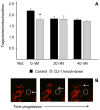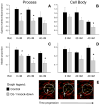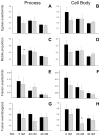DJ-1 knock-down impairs astrocyte mitochondrial function
- PMID: 21907265
- PMCID: PMC3490195
- DOI: 10.1016/j.neuroscience.2011.08.016
DJ-1 knock-down impairs astrocyte mitochondrial function
Abstract
Mitochondrial dysfunction has long been implicated in the pathogenesis of Parkinson's disease (PD). PD brain tissues show evidence for mitochondrial respiratory chain Complex I deficiency. Pharmacological inhibitors of Complex I, such as rotenone, cause experimental parkinsonism. The cytoprotective protein DJ-1, whose deletion is sufficient to cause genetic PD, is also known to have mitochondria-stabilizing properties. We have previously shown that DJ-1 is over-expressed in PD astrocytes, and that DJ-1 deficiency impairs the capacity of astrocytes to protect co-cultured neurons against rotenone. Since DJ-1 modulated, astrocyte-mediated neuroprotection against rotenone may depend upon proper astrocytic mitochondrial functioning, we hypothesized that DJ-1 deficiency would impair astrocyte mitochondrial motility, fission/fusion dynamics, membrane potential maintenance, and respiration, both at baseline and as an enhancement of rotenone-induced mitochondrial dysfunction. In astrocyte-enriched cultures, we observed that DJ-1 knock-down reduced mitochondrial motility primarily in the cellular processes of both untreated and rotenone treated cells. In these same cultures, DJ-1 knock-down did not appreciably affect mitochondrial fission, fusion, or respiration, but did enhance rotenone-induced reductions in the mitochondrial membrane potential. In neuron-astrocyte co-cultures, astrocytic DJ-1 knock-down reduced astrocyte process mitochondrial motility in untreated cells, but this effect was not maintained in the presence of rotenone. In the same co-cultures, astrocytic DJ-1 knock-down significantly reduced mitochondrial fusion in the astrocyte cell bodies, but not the processes, under the same conditions of rotenone treatment in which DJ-1 deficiency is known to impair astrocyte-mediated neuroprotection. Our studies therefore demonstrated the following new findings: (i) DJ-1 deficiency can impair astrocyte mitochondrial physiology at multiple levels, (ii) astrocyte mitochondrial dynamics vary with sub-cellular region, and (iii) the physical presence of neurons can affect astrocyte mitochondrial behavior.
Copyright © 2011 IBRO. Published by Elsevier Ltd. All rights reserved.
Figures









References
-
- Ascherio A, Chen H, Weisskopf MG, O’Reilly E, McCullough ML, Calle EE, Schwarzschild MA, Thun MJ. Pesticide exposure and risk for Parkinson’s disease. Ann Neurol. 2006;60:197–203. - PubMed
-
- Ballard PA, Tetrud JW, Langston JW. Permanent human parkinsonism due to 1-methyl-4-phenyl-1,2,3,6-tetrahydropyridine (MPTP): seven cases. Neurology. 1985;35:949–956. - PubMed
Publication types
MeSH terms
Substances
Grants and funding
LinkOut - more resources
Full Text Sources
Molecular Biology Databases

